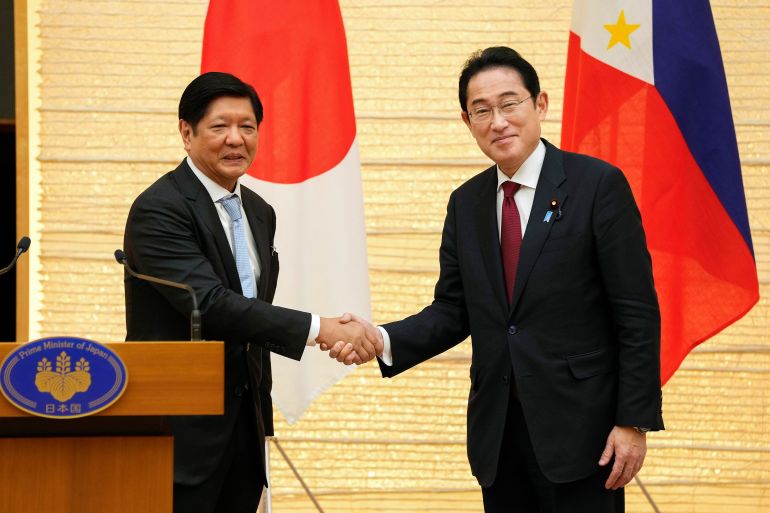Japan, Philippines agree to boost defence ties amid China tension
Agreement allows Japanese troops to join humanitarian exercises in the Philippines and is seen as a step towards deeper defence ties.

The leaders of Japan and the Philippines have agreed to increase defence ties, allowing Japanese troops greater access to Philippine territory.
The defence arrangement signed by Philippine President Ferdinand Marcos Jr and Japanese Prime Minister Fumio Kishida on Thursday will allow Japanese troops to join training exercises to respond to natural disasters and humanitarian needs in the Philippines.
Keep reading
list of 4 itemsPhilippines agrees to allow US wider access to military bases
ICC to resume investigation into Philippines’s deadly drug war
Philippines journalist Maria Ressa takes on the media
The agreement is seen as a step towards broader military cooperation between Tokyo and Manila and could lead to similar agreements between Japan and other nations in Southeast Asia where competition for geopolitical influence has increased amid a more assertive Chinese presence in the region.
Kishida said the countries will continue talks to further strengthen and streamline their militaries’ joint exercises and other operations, while seeking also to expand the transfer of Japanese defence equipment and technology to the Philippines as well as strengthening cooperation trilaterally with the United States.
“After our meeting, I can confidently say that our strategic partnership is stronger than ever as we navigate together the rough waters buffeting our region,” Marcos said at a joint news conference with Kishida.
Taiwan, which lies between Japan and the Philippines, has become a focal point of intensifying Chinese military activity that Tokyo and Washington worry could escalate into war as Beijing has promised to take back Taiwan, which it views merely as a rogue province and not a sovereign state.
Marcos’s visit to Japan come shortly after he and US Secretary of Defence Lloyd Austin reached an agreement on allowing the US more access to Philippine military bases to keep China’s territorial ambitions in check.
The Philippine and Japanese leaders “resolved” to increase the defence capabilities of their own countries and strengthen overall security cooperation with reciprocal port calls and aircraft visits and the transfer of more defence equipment and technology, according to a joint statement released late on Thursday.
It said Japan will transfer air surveillance radar systems to the Philippines and provide related personnel training.
The leaders “expressed serious concerns about the situation in the East and China Seas and strongly opposed the actions including force or coercion that may increase tensions,” the statement said.
Kishida and Marcos also agreed to strengthen economic and cybersecurity, and confirmed Japan’s continuing assistance to the Philippine coastguard in reinforcing its capabilities, including the improvement of port facilities at Subic Bay, a former US naval base.
“President Marcos’s visit here gives us impetus for Japan and the Philippines to further elevate our cooperation in recent years to even higher levels as we contribute to the peace and stability of the region and the international community,” Kishida said at the news conference.
The countries also agreed on loan arrangements and extensions for Philippine infrastructure projects, including $3bn to finance major commuter rail projects.
The agreement with Manila comes after Kishida’s government in December adopted key security and defence upgrades, including a counterstrike capability that breaks from Japan’s post-World War II principle of self-defence only, while also doubling defence spending within five years.
Japan is the Philippines’ biggest source of bilateral development assistance, according to Manila, and its second-largest trading partner. Japan is also the only country to have a bilateral free trade agreement with the Philippines.
Marcos met with Japan’s Emperor Naruhito and Empress Masako ahead of his talks with Kishida on Thursday and invited the imperial couple to visit the Philippines. He also plans to join talks with trade and business officials before returning to the Philippines on Sunday.